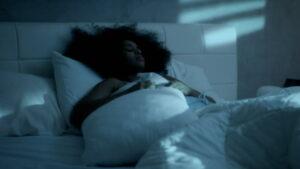Sleeping difficulties include trouble getting to sleep, remaining asleep, or waking up too early.
Both poor quality sleep and a lack of sleep can have a detrimental impact on a person’s health. Chronic sleep deprivation can even cause headaches, extreme fatigue, and cognitive impairment.
Sleeping problems can arise as a result of lifestyle circumstances, poor sleep hygiene, or the existence of an underlying medical illness. Whatever the cause, there are things a person may take to enhance their sleep quality or length.
Sleep disorders are conditions that interfere with or prevent you from getting enough restful sleep, resulting in daytime sleepiness and other symptoms. Everyone has sleep issues from time to time.

See also Bitter kola incredible health benefit and side effects
Sleep disorders can lead to the following health complications:
- Memory problems
- Difficulty concentrating
- A weakened immune system
- Increased blood pressure
- Increased risk of heart disease
- Lower sex drive
- Changes in appetite
- Unexpected weight gain
- Loss of balance and coordination
Types of sleeping disorders

There are different types of sleep disorders. The top ones are:
- Insomnia
People with this condition may have difficulty getting to sleep, staying asleep, or a mix of the two. Acute insomnia might last a few days or weeks, but chronic insomnia can linger for months.
- Sleep apnea
This is a disorder in which the upper airways get closed, preventing a person from breathing while sleeping. Sleep apnea patients may wake up several times during the night owing to snoring or a lack of oxygen.
- Restless legs syndrome
Restless legs syndrome (RLS) arises when tingling or painful feelings in the legs generate an insatiable need to move them. RLS symptoms often begin late in the day and peak at night.
- Narcolepsy
Narcolepsy is a persistent sleep disease characterized by excessive daytime tiredness and unexpected sleep bouts. People with narcolepsy frequently struggle to stay up for extended periods of time, regardless of the conditions. Narcolepsy can seriously interrupt your regular routine.
What causes difficulty sleeping

Common causes of insomnia include:
Numerous factors can contribute to sleeping difficulty. A person’s lifestyle, sleeping habits, and health status may all play a role.
Age is also a factor in the amount of sleep a person needs and the quality of sleep they tend to get.
Stress, an irregular sleep schedule, poor sleeping habits, mental health disorders like anxiety and depression, physical illnesses and pain, medications, neurological problems, and specific sleep disorders.
Diagnosis of insomnia
Depending on your circumstances, the diagnosis of insomnia and the search for its causes may entail the following:
- Physical examination
If the reason of your insomnia is unknown, your doctor may do a physical check to look for evidence of medical conditions that might be causing your sleeplessness. A blood test may be performed on occasion to screen for thyroid disorders or other illnesses that may be connected with poor sleep.
- Examine your sleeping habits
In addition to asking you questions about sleep; your doctor may ask you to complete a questionnaire to evaluate your sleep-wake pattern and level of daytime drowsiness. You may also be required to keep a sleep journal for a few weeks.
- Sleep research
If the reason of your insomnia is unknown, or if you have symptoms of another sleep condition, such as sleep apnea or restless legs syndrome, you may need to spend the night at a sleep center.
While you sleep, tests are performed to monitor and record a number of bodily activities such as brain waves, respiration, heartbeat, eye movements, and body movements.
What To Do When You Can’t Sleep

Depending on the type of sleep disorder you have, your doctor may recommend a medical treatment that can include:
- Sleeping pills or melatonin supplements
- Allergy or cold medication
- Medications for underlying health issues
- An assistive breathing device or surgery (usually for sleep apnea)
- A dental guard (usually for teeth grinding)
- Making lifestyle adjustments can also improve your quality of sleep, especially when combined with medical treatments. You may want to consider:
- Increasing vegetables and fish to your diet while reducing sugar intake
- Exercising to reduce stress and anxiety
- Establishing a regular sleeping schedule and sticking to it
- Drinking less water before bedtime
- Limiting caffeine intake, especially in the late afternoon or evening
- Cutting back on tobacco and alcohol use
- Eating smaller, low-carbohydrate meals before bedtime
When to see a doctor

Sleep deprivation may have a severe influence on a person’s mental and physical health.
Some people may have intermittent sleeping issues that go away on their own. Others may be suffering from an undetected or untreated medical issue that is interfering with their ability to sleep.
If a person’s sleeping trouble persists or has an impact on how they feel or perform during the day, they should consult a healthcare expert.
Sleeping pills
Some over-the-counter (OTC) sleep aids, such as melatonin, can help promote earlier sleep onset. Prescription sleep aids may be necessary for people who do not respond to OTC products or those with a sleep disorder.
